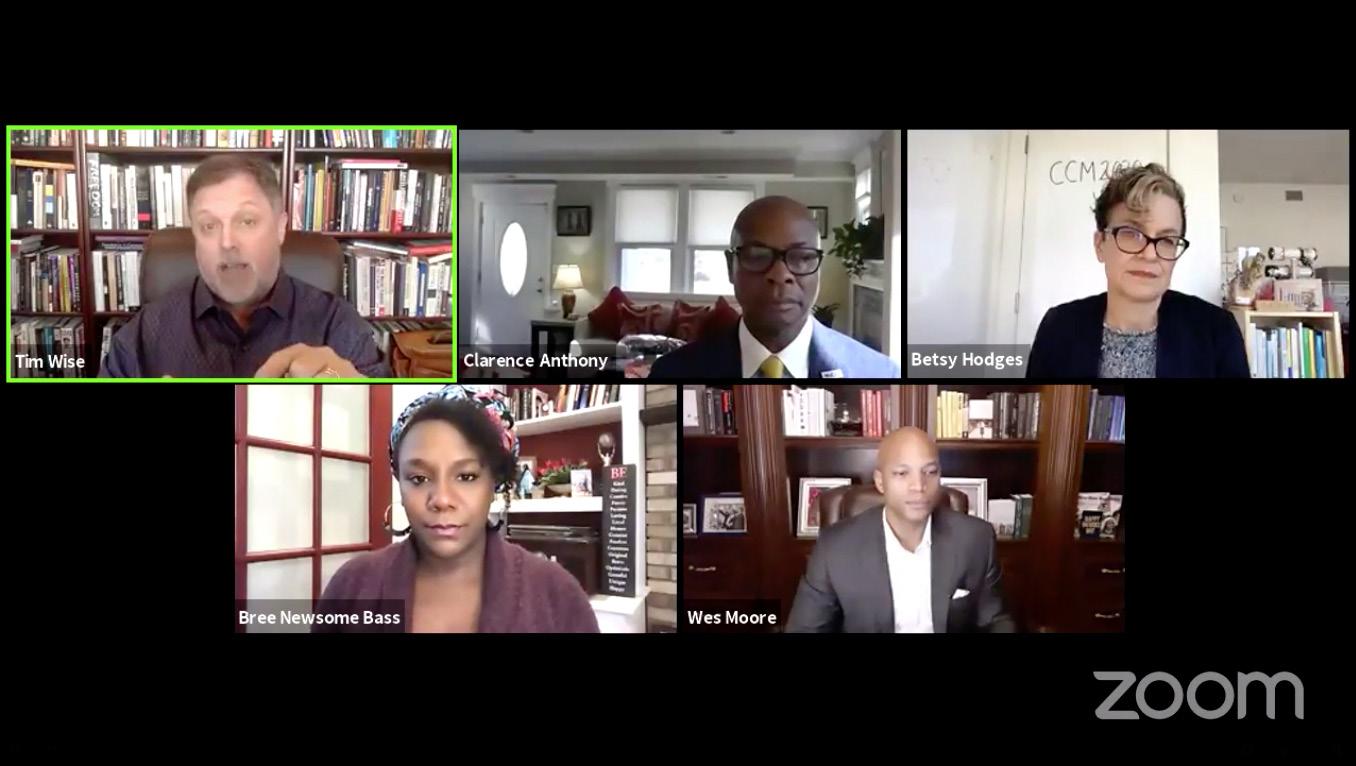
4 minute read
Achieving Racial Equity
National experts discuss local opportunities
Courage, understanding, cooperation – as our nation mourns the tragic loss of American’s like George Floyd, Ahmaud Arbery, and Breonna Taylor, whose deaths sparked national protests and calls for change - CCM’s CARES forums began to ask what it will take to make permanent changes to systems that have upheld racism for centuries. In the final 2020 CCM CARES Forum and as the main event in our annual convention, CCM invited a national panel of thought-provoking experts to tackle precisely that.
Nearly 400 viewers watched our panelists, Bree Newsome Bass, Betsy Hodges, Wes Moore, and Tim Wise, moderated by Clarence Anthony, CEO and Executive Director of the National League of Cities, live on Zoom to discuss topics ranging from the disproportionate impacts of COVID on minorities, funding in public education, and responding to those who say that this isn’t a problem in their community. Another 2,000 people viewed the event on Facebook Live.
One of the first questions discussed was whether or not we were at a tipping point – and the answer was both a yes and a no.
Tim Wise said, yes, this could be seen as a tipping point in the same way that the Civil War was a tipping point and the Civil Rights Act was a tipping point. But also no, white America’s default position is “hitting the snooze button” on progress.
This sentiment was paralleled by Betsy Hodges who said that white people probably aren’t at a tipping point, but that an aperture had been opened, one that shines a light on the fact that systemic racism has actually held all of us back.
“I think a larger number than before of white people can see that maybe something’s wrong with how we’ve set things up, that the systems are actually failing white people enormously,” she says, “Really the comparison is how are white people doing in a world without racism.”
Those structural problems are overwhelmed by a global pandemic and economic crisis – issues that can’t be addressed without addressing racism according to Bree Newsome Bass. Raising the sentiments of Martin Luther King, Jr., it’s not merely about “let’s integrate people who have been marginalized by the current system,” for Newsome Bass, “the current system has to change.”
And fixing the problems at the root of our society’s ills is no easy task. Wes Moore asks us to question whether or not actions today are performative, whether we are doing something that is “2020 effective” or will actually change the way we evaluate every single decision we make from a legislative perspective.
As discussed in the CCM CARES regional panels, the answer is that it’s going to take hard work, it’s going to take understanding of our systems and their outcomes, and it’s going to take courageous leaders to not only speak the truth say that we know something is wrong and it must change.
“Racism isn’t an act, it’s a system,” Moore said, and systems are made up of people. Local leaders, he argues, have the ability and responsibility to look to their communities, ask how we should address these systems and what obstacles do we have to overcome especially in terms of economic disparity and poverty.
Wise noted that in regards to the NIMBYs and Hands-Off groups that “somebody’s hands are on those schools, somebody’s hands are doing that to people who are not in the community.” There’s a problem of normativity and framing that prevents people from seeing just what it is they are doing.
“When these white folks try to stop the equalization of resources or the sharing of resources and hoard these resources to ourselves,” Wise said, “It’s not just that we do injustice to others, we’re not helping ourselves.”
Betsy Hodges shared words of experience as a former local leader herself on doing the work:
The first step is the conversation, but moderator Clarence Anthony closed with an important note: “this is the start of a conversation, it’s the start of the journey, but we don’t have all that time [..] I don’t want any of us to have this conversation three to five years from now and still be saying the same things.”
As Joe DeLong, Executive Director and CEO of CCM noted at the very end of the panel, while this may be the end of this discussion with our experts from around the nation, it’s still the beginning of the work needed to be done in the coming weeks and months, and even years ahead.






